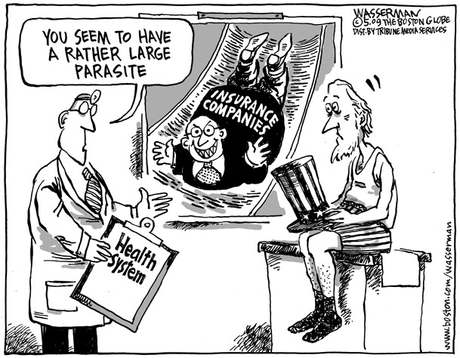 (Cartoon image is by Dan Wasserman in The Boston Globe.)
(Cartoon image is by Dan Wasserman in The Boston Globe.)One of the favorite ideas of Republicans, put forward to justify massive tax cuts for corporations, is that American corporations have trouble competing with foreign corporations because of the "high" tax rate corporations have to pay in this country. It's not true, but it sounds good to those voters who don't understand economics.
The truth is that American corporations have competed well with foreign corporations even when the taxes were much higher. Also, taxes are NOT a business expense. They are just a percentage of profit -- after real business expenses are taken out of gross income. Businesses that have little income pay little tax, and businesses that have large incomes pay more. And most American corporations avoid paying the legal tax rate anyway -- by hiding profit overseas and taking advantage of subsidies and tax loopholes.
However, there is a real business expense that hurts the competitive efforts of American businesses against foreign businesses. Most large American corporations provide health insurance for their employees, while most foreign corporations do not (because in most of those countries health insurance is considered a right, and is provided by the government).
And this is not a small expense. The average cost of providing employee health insurance for an American business is $5, 179 a year for a single employee, and $12,591 for a family. The single employee figure averages about 83% of the cost of insurance (meaning the employee pays the other 17%), and the family cost averages about 72% of the premium cost (with the employee paying the remaining 28%).
There is a better way -- a way that would benefit both businesses and workers. It's called single-payer health insurance. Medicare is a good example of single-payer health insurance. It's insurance provided by the government and covering all citizens. Most countries already do this, and in doing so they pay far less for health care than Americans pay (without hurting the efficacy of that medical care).
Single-payer health insurance would remove the burden of providing health insurance from businesses, allowing them to remove most of that real expense -- and compete on an even level with foreign corporations.
Single-payer would also benefit workers. Currently, the expense of health insurance is considered part of an employee's compensation. If that insurance did not have to be supplied by the employer, much of that expense could be given directly to the worker in the form of a higher wage (without hurting business profits at all).
It is true that to fund a single-payer system of health insurance, both employers and employees would likely have to pay a tax. But that tax (much like the current Social Security payroll tax) would be significantly lower than the current cost of private health insurance for both businesses and workers -- allowing the difference to be used for larger profits and higher wages.
This would also have side-benefits for the country. The higher wages would put more money into the economy through more spending, which would create more demand (creating bigger profits and more new jobs). It would also increase government revenue, because income taxes would be paid on both the larger profits and the higher wages.
In short, a single-payer system would be good for everyone -- giving all citizens health insurance, providing more profit for business, providing higher wages for workers, boosting government revenue, and stimulating the economy.

